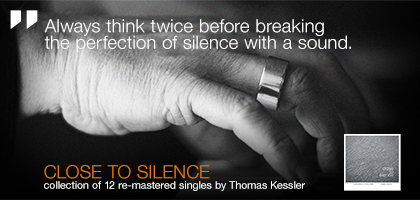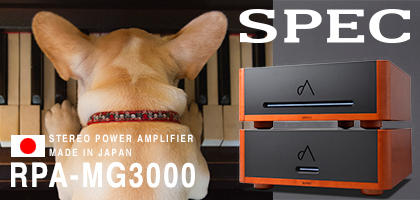No. 261 February 2026
- COVER REVIEW: TECHDAS Air Force IV ⸜ turntable » JAPAN
- RECORDING TECHNIQUE ⸜ music: 3M DIGITAL AUDIO MASTERING SYSTEM Part 2 || MUSIC » USA
- MUSIC ⸜ review: ARNE DOMNÉRUS, , Jazz At The Pawnshop, Proprius/AudioNautes Recordings MQA-CD Crystal Disc ⸜ 1977/2025 » SWEDEN / ITALY
- REVIEW: CIRCLE LABS AS100 ⸜ integrated amplifier » POLAND
- REVIEW: SHANLING EC Zero T ⸜ MQA-CD player • mobile » CHINA
- REVIEW: FEZZ AUDIO Sagita Prestige Evo & Olympia Evo Mono ⸜ linestage & power amplifier • monaural » POLAND
- MICRO REVIEW: ACOUSTIC REVIVE PS-DBLP ⸜ record clamp / stabilizer » JAPAN


|

|
|
ANIME ↈ SOUNDTRACK
Games are creates using several elements, and one of them is music. Almost every year more game soundtracks become popular, and multiple websites dealing exclusively with this subject (like the Polish portal gamemusic.pl), numerous vinyl releases and concerts are the best proof of that. One can name lots and lost of other examples supporting this statement, many of them one finds in newspapers on daily basis. 
Game soundtracks are often released on vinyl records. They are released not only but the big labels associated with giants of an electronic market, but also small specialized records labels such as the Polish Gamemusic Records. You don't believe me? Here you go! The organizers of the popular Film Music Festival in Krakow decided to devote one evening to music from games, during which tracks from such games as: Assassin's Creed 2, The Witcher 3 or Batman: Arkham Origins were played. In turn, Christopher Tin, author of music for games from the Civilization series, broke the record on Kickstarter, collecting over $ 220,000 for an album inspired by the song Sogno di Volare (The Dream of Flight), known from the sixth part of the above series (more HERE). Confirmations of my words can also be found among artists who – until recently – had almost or completely nothing to do with the "gaming" industry. For example, Steven Wilson, one of the most important figures of progressive rock, prepared music for the Last Day of June. Also Adam "Nergal" Darski decided it was time to give it a try, this time not as composer but as a voice over for the Apocalipsis: Harry at the End of the World. Nota bene , the former supposedly recognized computer games as a kind of art while working on the music for the Last Day .... In the video game industry, same as in virtually all areas of pop culture it is the United States that plays a leading role. However, it is works from Japan that have a special status; by the way, it is a similar situation we know from audiophile world, isn't it? Building on the aesthetics known from manga and anime, they offer a unique perspective at "gaming" entertainment and sport a loyal group of fans, also outside the borders of the Land of the Rising Sun. Japanese approach to video games is not highly regarded by everyone, but I do not know of even a single person who would negate the contribution of this country to the development of the computer games industry. An important element of games from the samurai country is also - obviously! - music. Most of it is created by local composers, whose names outside Japan still - unfortunately - do not enjoy the fame they deserve. They are composers per se, i.e. extremely talented and professional, not really different from the biggest, best known creators of Hollywood soundtracks. 
Japanese music accompanying visual arts is associated mainly with anime soundtracks. Not without a reason. Works such as the OST for the animated movie Ghost in the Shell are phenomenal works that every music lover should listen to, at least once. Thus, using the fact that the "birthday" (we are 14 years old!) Edition of "High Fidelity" is traditionally devoted to Japanese products and its musical and audio cultures, I wanted to bring to the attention of our readers two notable (at least in my opinion) soundtracks and their creators. One of these works is quite old – in terms of the "gaming" industry it's almost ancient - while the second is just over a year old. Both are, however, evidence that music from games is a fascinating genre and that it is worth delving into it in a search of amazing experiences. NINTENDO In the Nintendo catalog, one can find several titles of colossal importance for the development of the global gaming industry. Suffice to say that it were the Japanese who were responsible for the creation of such series as Donkey Kong, Mario or Zelda. This already impressive résumé is complemented by the numerous achievements in the field of hardware. Nintendo created such consoles as NES and SNES, Nintendo 64, Wii and Game Boy. The latest console developed and produced by the company from Kyoto is Nintendo Switch, which by December the 12th last year was purchased by over 10 million players. 
The Japanese video games are very popular not only on the domestic market, but also in Europe and in the United States. In the picture above there are three productions from the Land of the Rising Sun, the PS4 versions: Shadow of the Colossus, Yakuza 0 and Yakuza 6: The Song of Life. | SUPER MARIO BROS. SOUNDTRACK Super Mario Bros. (J. スーパーマリオブラザーズ) is a platform video game released by Nintendo on September 13th, 1985. It was this title that placed the Japanese company on the American market, taking advantage of the huge collapse in the US gaming industry that took place in 1983. This title has been a great success; not only in terms of sales (Guinness Book of Records says that there were 40 million copies of the Super Mario Bros. sold), allowing Nintendo to finally expand outside Japan, but also completely changed the way of thinking about games, that until that moment were nothing but a simple, not particularly complex or sophisticated form of entertainment. Nintendo owes this success to various factors, including an innovative approach to music accompanying the game. Until the release of Super Mario Bros., game soundtracks almost exclusively were doing just that – accompanying the gameplay - if there was any place for it at all in the given title. It was not considered a valuable component of the game or - even more so - a work in itself. The uncomplicated sounds were primarily aimed at drawing the player's attention in arcade salons, so that he would devote his time (and, of course, money) to the particular game. Kōji Kondō (Jap. 近藤 浩 治), composer born in Nagoya in 1961, approached the issue differently. When the Super Mario Bros. was developed Kondō was not a successful composer, yet he was able to convince the leadership of Nintendo to entrust him with such an important project. For the company, it was a crucial project, a turning point that was supposed to open the doors of American video game stores for them. The risk paid off because the young composer created, as it turned out, a revolutionary work. 
More and more soundtracks from games come out in some physical form: whether on vinyl or CD. When it comes to Japanese labels, one can usually count on particularly beautiful releases: great printing and interesting content. This is the case, among others, with the soundtrack for the Persona 5. Although the soundtrack for the Super Mario Bros. - as Andrew Schartmann notes in his book Koji Kondo's Super Mario Bros. Soundtrack - lasts less than three minutes, it was enough to change the paradigm of composing music for games. From now on, it was not just a stopgap, something playing in the background, just a humming noise, anymore. Kondō offered players instantly recognizable melodies, which differed from each other clearly depending on the location of the hero of the game and which – that was equally important - perfectly matched the events presented on the screen. There was no place for randomness, a blind fate. Music in the Super Mario Bros. and how it was used was thoroughly thought out by the composer and game developers, which resulted in a completely new quality in this field. It is worth stopping here for a moment and explaining what I meant by "used". As it happens, Kondō anticipated a twofold role for his music. It was supposed to not only affect the player's emotions, but also his body. Its aim was to synchronize with the rhythm of the game - and thus with the rhythm of the person taking part in it - and thus increase the intensity of the experience offered by the game. The aforementioned Schartmann notes that it was not a complete novum in thinking about music for games, but it was Kōji Kondō who honed this idea. The music itself, although not too complicated or too long (which was related to the limitations imposed by the technical aspects of the NES console the Super Mario Bros. was developed for), is still a great example today of how a simple thing can be so involving and exciting emotions. I would recommend going HERE and spending less than three minutes to listen to it, bearing in mind that it was supposed to be played by a device that was in fact a somewhat more efficient calculator with a limited amount of different sounds that it was able to produce. 
SQUARE ENIX |

| NIER: AUTOMATA ORIGINAL SOUNDTRACK Lets fast-forward to 2017. The three-disc album NieR: Automata Original Soundtrack hit the music stores. It accompanied the NieR: Automata game and was a complete opposite of what is the music from Super Mario Bros. was. There were several people responsible for its creation: composer, vocalists, an orchestra and many other people, all of whom I can not even name here. This release offers over three and a half hours (one probably needs less time to finish the whole Super Mario Bros. gameplay) of an epic, sometimes bombastic music, which without any complexes claims the right to be a full-fledged work of art; yes - supporting events in the game itself, but also working perfectly well on its own. The above mentioned composer was Keiichi Okabe (Japanese 岡 部 啓), the same man who prepared music for such titles as: Final Fantasy XV: Episode Gladiolus, Tekken 7 or Drakengard 3. He teamed up again (in his descriptions I came across in English the words team or studio) with Monaca, as well as the vocalist Emi Evans, which, I believe, was actually a co-composer of the musical material. It is worth noting that the same team is responsible for the music to the previous part NieR: Automaty (titled NieR), extremely warmly received (I mean both, the game and the soundtrack) by fans and critics. 
Listening to the NieR: Automata soundtrack is always a great adventure for me. Though demanding (listening to the music for such a long time is not as easy as it may seem), it is also a rewarding effort. There is a place in there for a whole range of different emotions. There are Hollywood-like melodies, heart-lifting and warming up for battle ones. There are also calmer moments that encourage reflection and those with a slightly more esoteric or simply odd character (for example when – out of the blue - a child begins to sing to a simple, marching melody). In building the right climate, ambiance of the game, equally important as the music are the above-mentioned vocals. Most of them were sang by Emi Evans, an Englishwoman living in Tokyo. Her amazing performance is not the only thing that attracts attention, but also to the specific words she sings. It so happens that for the purpose of the game (same as for the first part NieR ...) she had to come up with "futuristic languages" that could be future versions of French, Portuguese or Japanese. This otherwise atypical choice (dictated by the "gameplay" terms) resulted in a release of the vocal from the semantic layer; what counts is the sound itself and the whole soundtrack benefits greatly from it. 
It is worth noting that Square Enix, the game's publisher, has released not only a three-CD box (priced at 3200 yen), but also other delicious goodies. In December 2017 a beautiful box with four vinyl records with music from both parts NieR was also released. Of course, eight sides of vinyl records could not include all the music from both games, but only part of it. 35 songs were selected by Keiichi Okabe himself. An interesting fact is that the graphic design of this release was prepared by Sui Ishida, a mangaka responsible for the extremely popular Tokyo Ghoul series (in Poland, its publisher is the Waneko company from Warsaw). The range of available goods is complemented by the NieR: Automata Piano Collections album with the music from the game arranged for the piano, as well as the recording of the concert which took place in 2016 in Japan, during which music from both parts of the NieR ... was played. 
Sui Ishida, the author of the manga entitled Tokyo Ghoul is responsible for the visual layer of the vinyl release of the soundtrack from the NieR game series. | SOUNDTRACKI Z GIER – WHAT'S WORTH LISTENING TO? Shall reading this article encourage you to delve into the world of game soundtracks I can consider my task well done. What should you start your adventure with especially if you're not a video games fan - therefore – you know nothing about the subject? Apart from the two OSTs described above, you should consider three other significant works: World of Warcraft: Warlords of Draenor Soundtrack, Johto Legends (Music from 'Pokémon Gold and Silver') and God of War (PlayStation Soundtrack). 
The first work accompanied the MMORPG (Massively multiplayer online role-playing game) World of Warcraft: Warlords of Draenor. This is the sixth game in the popular online series World of Warcraft. Each of the previous parts featured such a soundtrack, but it was the one for the Warlords of Draenor that the publisher - Blizzard - achieved a new, outstanding level. The soundtrack stuns listener with the scale and momentum that even Mahler and Mendelssohn working together would not be ashamed of, offering a diversified musical tale in which intense moments go hand in hand with slightly more subtle ones. Unfortunately, this soundtrack is not readily available. You can listen to it all, or to parts of it on YouTube, the really determined ones should be checking online auctions for a CD release. This work, however, can not be found on popular streaming websites (which is strange considering that other soundtracks for the World of Warcraft are available on Spotify), or in music stores. 
Johto Legends (Music from "Pokémon Gold and Silver") is an album, which includes melodies present in classic games Pokémon Gold and Pokémon Silver for the Game Boy console. However, for the purpose of this project they were arranged for an orchestra, which gave them the appropriate depth and scale they always deserved. The release of this album was financed by the community of players and music lovers on Kickstarter (HERE) and undoubtedly, it was well-invested money. You can listen to it, for example, on TIDAL or Spotify, or buy one of several versions: digital and CD HERE), and also on double vinyl (HERE). 
The last of my proposals is the soundtrack from God of War, which premiered on April 20 this year. It was prepared by Bear McCreary, a composer known for, among others, the music for the Battlestar Galactica TV series from 2004. It's a completely new release - the CD went on sale on April 27, so only four days ago. It should appeal to all those who appreciate, above all, a good-sounding choir. The one you will hear in this OST is Schola cantorum Reykjavicensis. An interesting fact, it is one of the very few in the world that performs songs in Old Norse, which – in my opinion - sounds fantastic! For the OST for the latest part of God of War vocal were recorded in this language and they really make a great impression. The creators and publisher of the game - Sony Interactive Entertainment - are not only proud of their work but also, which in no less important, aware of its quality, which is why they shared with fans two interesting videos that allow them to peak into both the processes of creating and recording musical material, as well as to how the music and sound are implemented in the game itself (you can find them HERE and HERE). The contents of the soundtrack, as I have already revealed, was released on a CD, but you can also get to know it through streaming platforms, for example Tidal. 
A great advantage of game soundtracks is greater attention to the visual aspect of the release than is the case with most of the movie soundtracks. An example: a beautiful release of the The Heroes Piano Sonatas album by Paul Anthony Romero from Gamemusic Records. | TO SUM IT UP The soundtracks described by me are barely a tiny part of what the gamers from around the world have been listening to for many years. However, they showcase not only the changes that music from games has undergone through less than 35 years, but they are also a living proof of the creativity and creative spirit of composers of this type of music. They are fundamentally different, but at the same time similar in their pursuit of artistic perfection. They are also, as it seems to me, a good start into the world of music composed for the needs of video games. The world, let me say, beautiful and dynamically developing, regardless of whether someone will recognize video game as art or not. | BIBLIOGRAPHY
|
About Us |
We cooperate |
Patrons |
|
Our reviewers regularly contribute to “Enjoy the Music.com”, “Positive-Feedback.com”, “HiFiStatement.net” and “Hi-Fi Choice & Home Cinema. Edycja Polska” . "High Fidelity" is a monthly magazine dedicated to high quality sound. It has been published since May 1st, 2004. Up until October 2008, the magazine was called "High Fidelity OnLine", but since November 2008 it has been registered under the new title. "High Fidelity" is an online magazine, i.e. it is only published on the web. For the last few years it has been published both in Polish and in English. Thanks to our English section, the magazine has now a worldwide reach - statistics show that we have readers from almost every country in the world. Once a year, we prepare a printed edition of one of reviews published online. This unique, limited collector's edition is given to the visitors of the Audio Show in Warsaw, Poland, held in November of each year. For years, "High Fidelity" has been cooperating with other audio magazines, including “Enjoy the Music.com” and “Positive-Feedback.com” in the U.S. and “HiFiStatement.net” in Germany. Our reviews have also been published by “6moons.com”. You can contact any of our contributors by clicking his email address on our CONTACT page. |
 



|
   |







 omputer games (I will use three terms interchangeably: computer games, video games or simply games) is a separate kind of ART. Period. Perhaps not everybody has to like this sentence - or rather its implications - but every educated person with an open mind must admit that this is the case. Video games have long aspired to be treated like one, and finally they have riched proper level. In the 21st century, they offer more than just pure entertainment, something that allows them to be considered as art. They are able to provide excellently written stories (take such titles as: The Last of Us or Uncharted 4 for example), navigate important and difficult topics (This War of Mine) or create amazing worlds, full of reliable details and interesting events (Witcher 3). Of course, their most important goal is entertainment, but it is also the case with other areas of culture that we classify as art without a wink: movies, theater plays or books.
omputer games (I will use three terms interchangeably: computer games, video games or simply games) is a separate kind of ART. Period. Perhaps not everybody has to like this sentence - or rather its implications - but every educated person with an open mind must admit that this is the case. Video games have long aspired to be treated like one, and finally they have riched proper level. In the 21st century, they offer more than just pure entertainment, something that allows them to be considered as art. They are able to provide excellently written stories (take such titles as: The Last of Us or Uncharted 4 for example), navigate important and difficult topics (This War of Mine) or create amazing worlds, full of reliable details and interesting events (Witcher 3). Of course, their most important goal is entertainment, but it is also the case with other areas of culture that we classify as art without a wink: movies, theater plays or books. 


